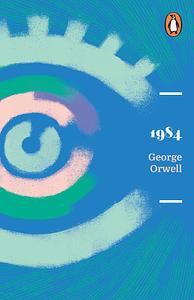Take a photo of a barcode or cover
Éste es un texto legendario que entraña un interrogatorio profundo y multifacético del totalitarismo, pero de forma notablemente menos pulcra que Rebelión en la granja, la novela anterior de Orwell. 1984, a pesar de su world-building cautivador, padece un argumento de ritmo inconsistente, un tono que a veces se vuelve innecesariamente didáctico, y personajes de cartón—tal vez Orwell aducía que un sistema totalitario despoja a la gente de todo rasgo de individualidad. Sin embargo, aún se siente el impacto emocional de este libro a toda fuerza.
slow-paced
Plot or Character Driven:
Plot
Strong character development:
Yes
Loveable characters:
No
Diverse cast of characters:
Complicated
Flaws of characters a main focus:
Yes
I’ll be honest I read this only for the Andrew Garfield and Andrew Scott Audible edition… but was reminded how terrifyingly good this book is. Filled my need for a dystopian and now time to read something slightly less depressing
challenging
reflective
medium-paced
Plot or Character Driven:
A mix
Strong character development:
Complicated
Loveable characters:
No
Diverse cast of characters:
No
Flaws of characters a main focus:
Yes
Orwell writes a brutal introspection on fascism.
One of many takeaways: love is a political act.
Orwell dances with Spivak's subaltern theory, "Indeed, so long as they [the masses] are not permitted to have standards of comparison they never even become aware that they are oppressed" (171).
As previous President, Ronald Reagan, once said, "We are in danger of producing an educated proletariat," and President Donald Trump has also said, "I love the poorly educated," 1984 describes how a fascist government controls then strips humans of their most humane qualities: love, hope, trust -- by minimizing and strictly managing the people's education.
""Who controls the past," ran the Party slogan, "controls the future: who controls the present controls the past"" (32). History has always been, and continues to be, written and rewritten based on the author and intended audience; so, what do we deem as fact or opinion? In similar vein, our current day fascists are threatened by Critical Race Theory as the Party is threatened by Winston -- jointly, they are at war with the people/the educated proletariat/the poorly educated.
One of many takeaways: love is a political act.
Orwell dances with Spivak's subaltern theory, "Indeed, so long as they [the masses] are not permitted to have standards of comparison they never even become aware that they are oppressed" (171).
As previous President, Ronald Reagan, once said, "We are in danger of producing an educated proletariat," and President Donald Trump has also said, "I love the poorly educated," 1984 describes how a fascist government controls then strips humans of their most humane qualities: love, hope, trust -- by minimizing and strictly managing the people's education.
""Who controls the past," ran the Party slogan, "controls the future: who controls the present controls the past"" (32). History has always been, and continues to be, written and rewritten based on the author and intended audience; so, what do we deem as fact or opinion? In similar vein, our current day fascists are threatened by Critical Race Theory as the Party is threatened by Winston -- jointly, they are at war with the people/the educated proletariat/the poorly educated.
Graphic: Torture, Classism
reflective
medium-paced
Plot or Character Driven:
A mix
Strong character development:
Yes
Loveable characters:
No
Diverse cast of characters:
No
Flaws of characters a main focus:
Complicated
This was excellent. It’s a classic for a reason. It really made me think about how I live and why I live it the way I do.
dark
reflective
challenging
dark
informative
reflective
tense
slow-paced
Plot or Character Driven:
Plot
Strong character development:
No
Loveable characters:
No
Diverse cast of characters:
No
Flaws of characters a main focus:
Complicated
challenging
dark
mysterious
tense
slow-paced





